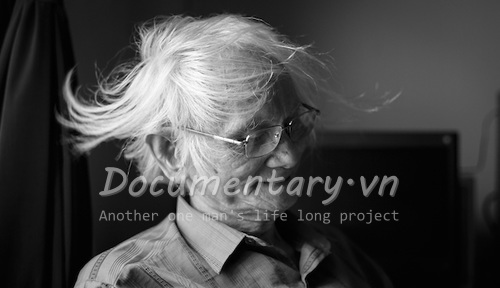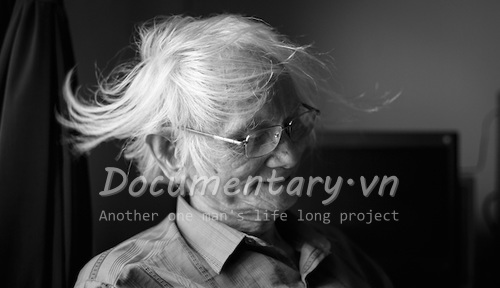
Few people know that before becoming a professor of Linguistics, Nguyen Lai was a man of literature. He graduated from the Faculty of Literature, Hanoi University of Science in 1963. At first, the Faculty intended to keep him as a lecturer and researcher of literary theory, because he had a tendency to write. I still remember that the first time I met him, I vaguely recognized that he was the author of a short story that I had read a long time ago, so I asked:
- Sir, are you the author of a short story that has been selected in the book?Reading Grade 4(a book used for students in the former Southern Liberation Area) with the opening sentence: "Cạch! Cạch! Cạch!...", right?
He looked at me excitedly and asked when I had read that story. I told him my deep impression after reading his story. The story was called “The Stone Lady”.
Speaking of Nguyen Lai, the current generations of students and staff of the two faculties of Literature and Language all retain the deepest impressions, considering him a kind and “too good” teacher to his colleagues and students. He is a teacher, a scientist whose humanity permeates every aspect of his soul and personality.
Before becoming a scientist, Professor Nguyen Lai had worked in many environments. Born in the year of the founding of the Indochinese Communist Party, when he was only 15 years old, he joined the Viet Minh organization. He then became a member of the Communist Party at the age of 17. At the age of 18, he took on the position of Secretary of the Party cell of Phu Xuan commune, Dien Khanh, Khanh Hoa. After a year of working in the locality, he was sent to high school and then transferred to the district to do propaganda work. In 1954, the Geneva Agreement was signed, he gathered in the North and was appointed Head of the Propaganda Department of the Reform Delegation of Thai Binh province and Hong Quang area. From 1957 to 1959, he continued to work in Propaganda in Phu Tho. After that, he studied at the Faculty of Literature, Hanoi University. In 1963, after graduating, he was retained as a lecturer in literature.
After working at the Faculty for 7 years, he was assigned to work as a Vietnamese language expert in the German Democratic Republic. This was a special opportunity for him. Thanks to his diligence in learning and accumulating teaching experience, he determined his long-term professional direction. That is to delve into linguistic research.
During this time, due to the increasing need to teach Vietnamese to foreigners, he devoted himself to researching a group of word types, which are directional verbs. While teaching, he also did research. After completing his term of service, he successfully completed his duties as a language teaching expert, and successfully defended his Associate Professor thesis (now PhD) at Humbôn University, a prestigious university in the world, with the topicVerbe der Richtung in der Vietnamesischen Sprache(Vietnamese direction verbs).

Returning to the country, he joined the Board of Directors of the Faculty of Literature, serving as Vice-Director and then as Dean (1979-1986). This was a period when the country faced many difficulties. The South had just been liberated, and the administrative and bureaucratic subsidy mechanism had not yet been abolished. The national economy was in a serious crisis. However, he and the Party Committee and the Board of Directors of the Faculty firmly steered the ship to help the entire Faculty overcome difficult challenges. Training and scientific research were still maintained and developed. Although there were many negative aspects arising in society, the environment of the Faculty of Literature was still a healthy environment for teaching and learning. Students were still disciplined and enthusiastic about their ideals and expertise. That was because, in the faculty, there were masters who were role models, among whom he was an exemplary teacher in his pioneering spirit and "revolutionary offensive" spirit in science and technology. While undertaking the tasks of leading the Faculty, participating in the School Party Committee and the Scientific Council, Nguyen Lai still devoted his most dedicated time to delving into the field of semantics. He applied the basic principles of Marxist Philosophy to the study of the relationship between the structure and meaning of Vietnamese movement-oriented words and developed the ideas formed from his PhD thesis. Another 7-year cycle since successfully defending his PhD thesis (1976-1983), he completed his PhD thesis in Linguistics (now Doctor of Science). He sent the manuscript to the neighboring country to wait for the day to defend it. He was absent for a year during his term as Dean of the Faculty and finished defending his PhD thesis in 1984.
After many years of working and working in the German Democratic Republic, Nguyen Lai has absorbed a very positive aspect of German thinking, which is the ability to generalize and summarize laws. Germany is famous for being a nation with a high level of philosophical thinking. A coincidence of fate has given Nguyen Lai this advantage. It also makes his research works have unique features that are completely different from those of his colleagues in the field. On the one hand, it is highly abstract, sometimes a bit confusing, but on the other hand, it has great depth and appeal. Thanks to that, scientist Nguyen Lai has a real stature as an "elder" in the field. He is not only a member of the Scientific Council but also the Chairman of many important Councils of the field. In addition, he also participates in many international organizations such as: GAL (Applied Linguistics Association - Federal Republic of Germany), PALA (Poetics and Language Association - England). He is also recognized as OUTSTANDING PEOPLE OF THE 20TH CENTURY by the International Biographical Center Cambridge. His strength is combining in-depth research with interdisciplinary research to find new directions in solving complex problems of literature. Therefore, he delved into semiotic theory, hoping to explain some phenomena of poetics. In an interdisciplinary direction, he published a number of works related to language and literature, language and thinking such as:Language and literary creation(Social Sciences Publishing House 1991),Language and thinking(Social Sciences Publishing House 1991). He is also the author ofLectures on general linguistics(VNU Publishing House 1997, reprinted 1999) and is the author of the workHo Chi Minh Language Vision(Labor Publishing House 2007). These are also valuable works serving training work at universities.
For me, Nguyen Lai is not only a scientist but also a person with a very rich literary soul. Thanks to his literary soul, in daily life as well as in research work (the language major he pursued was dry), we see that Nguyen Lai always has a soft and poetic way of behaving and writing. In the years he was the head of the department, I know that he rarely "offended" anyone, because he always knew how to be gentle even in the most "tense" situations. During the time he taught Vietnamese combined with defending his Associate Professor and Doctoral theses in the German Democratic Republic, he wrote 3 short stories and they were translated into German. Up to now, in addition to his works and research articles on language, he has published a novelAcross the River, The Strange Buffaloand a collection of short stories for teenagersThe search for the pilot lieutenant. 6 of his stories have been translated into German and the former Soviet Union. Although he became a real linguist, a leading expert on directional words, he still has many "debts" with literature. It is this characteristic that suddenly made me and him become in tune. Now he lives half a country away from us, he is much older, but every time I think of him, I still think of him - the Teacher - a scientist who loves literature and has a kind soul.
|
PROFESSOR, DOCTOR OF SCIENCE, PEOPLE'S TEACHER NGUYEN LAI
+ Work unit: Faculty of Literature (1963-1980). Faculty of Linguistics (1981-2003) + Management position: Head of the Faculty of Literature (1980-1985). Head of Department of Linguistics - Theory and Application, Faculty of Linguistics (1986-1991). Member of the Society for Applied Linguistics of the German Democratic Republic, member of the Society for Poetics and Linguistics of the United Kingdom (1991-2003).
+Vietnamese words indicating direction of movement, Monograph, Hanoi University of Science, 1990. +Language and literary creation, monograph, Social Sciences Publishing House, 1991. +Language and literary creation and reception, monograph, Education Publishing House, 1996 reprinted 1998. +Semantics of Vietnamese movement direction words, monograph, Social Sciences Publishing House, 2001. +Vietnamese language and great cultural figure Ho Chi Minh, monograph, VNU Publishing House, 2003.
+ Award of the Vietnam Linguistics Association for the workRevolution and science in Ho Chi Minh's linguistic vision. |
Author:Associate Professor, Dr. Nguyen Huu Dat